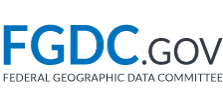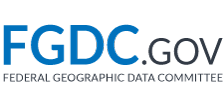Why Standards Matter
Standards improve the utility and value of geospatial data. They improve interoperability, reusability, and make it easier to aggregate, link, integrate, and share information among Federal, state, Tribal, regional, and municipal governments, private industry, non-governmental organizations, and academia.
Authority
The Geospatial Data Act of 2018 (GDA), 43 USC Ch. 46, Section §2802, establishes the Federal Geographic Data Committee (FGDC), Chaired by the Department of Interior, as the lead entity in the Executive Branch for the development, implementation, and review of policies, practices, and standards relating to geospatial data.
The GDA also details the responsibilities of Covered Agencies. These responsibilities are further detailed by the Office of Management and Budget's (OMB) Circulars A-16 and A-119. Circular A-16 directs the "Coordination of Geographic Information and Related Spatial Data Activities." Circular A-119 addresses the development and use of voluntary consensus standards.
Geospatial Data Standards Policy
The limitation on the use of Federal funds imposed by 43 USC Ch. 46, Section §2809A(b) does not apply on the basis of standards established by the FGDC prior to the enactment of the GDA. The FGDC has not established standards since the enactment of the GDA. Once the FGDC establishes standards for a data theme under the GDA, the "Limitation on the use of Federal funds" imposed by 43 USC Ch. 46, Section §2809 will apply with respect to that theme beginning five years after the date of establishment.
Way Ahead
The FGDC's Executive Committee established a Standards Task Team to update the FGDC's standards management process and recommend a path forward to the FGDC. The Task Team met with federal and non-federal standards development organizations to review existing processes and identify best practices. The Team is assessing the old FGDC standards list, evaluating a potential fast-track approval process for standards currently in use, modeling legacy processes, documenting user needs, and considering resource constraints to better understand community requirements and develop a recommended way ahead for the FGDC. The Task Team will draft a proposed standards management process based on the identified requirements and present it to the FGDC Executive Committee who will make a recommendation to the FGDC Steering Committee.
Note: Many standards approved by the FGDC prior to the enactment of the GDA remain in use and continue to provide value and improve interoperability.
Standards facilitate development, sharing, and use of geospatial data and services. The FGDC develops or adopts geospatial standards for implementing the NSDI, in consultation and cooperation with State, local, and tribal governments, the private sector and academic community, and, to the extent feasible, the international community.
Federal agencies that collect, use, or disseminate geographic information and/or carry out related spatial data activities shall use FGDC-endorsed standards both internally and through their activities involving partners, grants, and contracts.
Non-Federal agencies are encouraged to use FGDC-endorsed standards to facilitate data sharing.
Benefits
There are numerous benefits of standards.
FAQs
Find answers about FGDC Standards.
Standards Policies
Find standards
- FGDC Endorsed Standards (Prior to the Geospatial Data Act)
- FGDC Standards under development
- Discontinued standards: these projects, which did not result in FGDC-endorsed standards, were discontinued at the request of the sponsor.
ORGANIZATIONS
The FGDC Standards WG works with other Federal standardization activities and external standards organizations to ensure the best possible technical foundation for data and web services, consistent with standards policies.
Standards under review
- ISO 19115-3:2016, Geographic information -- Metadata -- Part 3: XML schema implementation for fundamental concepts
- OGC Web Coverage Service (WCS) 2.0 + extensions, with retirement of WCS 1.1.2
- OGC Web Processing Services (WPS) 2.0 [14-065], with confirmation of WPS 1.0.0
- OGC Geography Markup Language GML 3.3 [10-129r1], with confirmation of GML 3.2.1
- OGC Geography Markup Language (GML) simple features profile (with Corrigendum) (2.0) [10-100r3]
- OGC KML 2.3 [12-007r2], with confirmation of OGC KML 2.2.1
- OGC Filter Encoding (FE) 2.0.2 [09-026r2], with retirement of FE 1.1
- OGC GeoPackage 1.1 [12-128r12], with retirement of OGC GeoPackage 1.0, which has been deprecated
- OGC Web Services Context Document (OWS Context) 1.0 [12-080r2] and Atom Encoding standard 1.0 [12-084r2], with retirement of OGC Web Map Context
News / Announcements
- Visit Overview of the FGDC standards program for a brief history and highlights of the FGDC standards program.
-
The INCITS membership cycle begins December 1, 2017. OMB Circular A-119 (2016) directs Federal agencies to (1) use voluntary consensus standards in lieu of government unique standards and (2) participate in voluntary consensus standards bodies. It also expresses a preference for for international standards. INCITS Technical Committee L1 serves as the U.S. Technical Advisory Group to ISO Technical Committee 211, Geographic information/Geomatics. To join INCITS L1, visit Apply for Membership, http://www.incits.org/participation/apply-for-membership
RESOURCES
- Geospatial Interoperability Reference Architecture (GIRA) Web PDF The GIRA discusses "[several] attempts to identify ‘base-line’ or ‘essential’ geospatial standards that could be included in scopes of work or procurement compliance language have been made."
- Schemas - for the Geographic Information Framework Data Standard (XML), Address Data Standard (XML), and the FGDC Content Standard for Digital Geospatial Metadata (DTD).
- FGDC Standards Development Process
- Standards education and training

